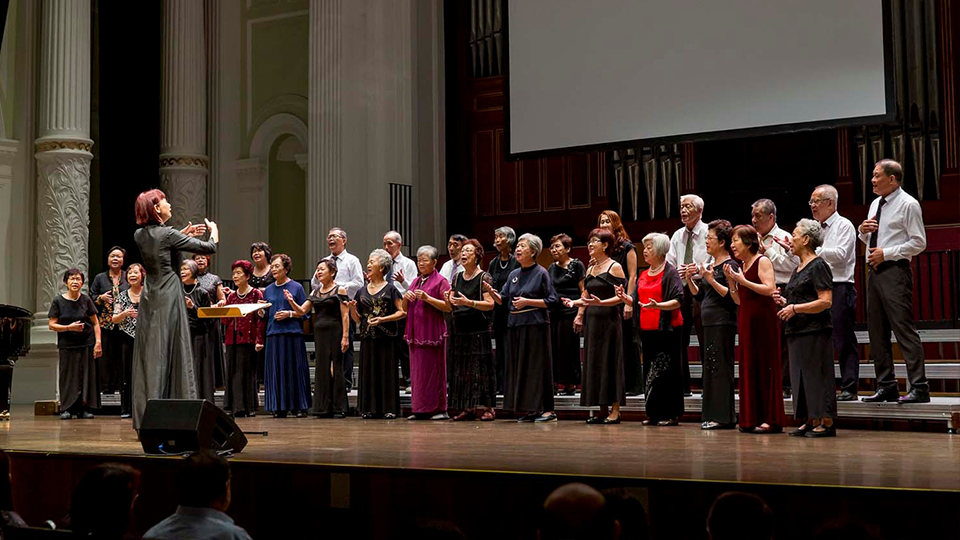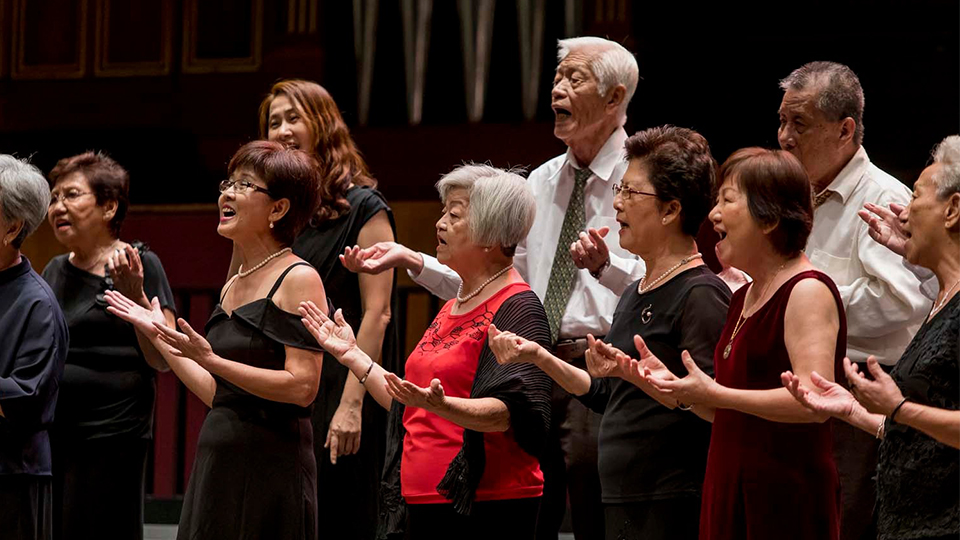A song a day keeps dementia at bay
Published: 16 Feb 2021

Cognitive function declines with increasing age and impaired cognitive function presents a major obstacle to healthy, functional, productive and successful ageing. With a rapidly-ageing population, effective interventions are critical to maintaining good cognitive function and preventing age-related cognitive decline.
New research by the NUS Yong Loo Lin School of Medicine suggests that choral singing intervention (CSI) is equally effective in delaying cognitive decline as a structured health education programme (HEP) which targets known risk factors of dementia such as hypertension, obesity, smoking, depression, physical inactivity, diabetes, and social isolation.
In a randomised controlled trial (RCT), Dr Feng Lei, a research assistant professor from the Department of Psychological Medicine at NUS Medicine worked with 93 participants who had an average age of 70. One group of these senior citizens were assigned to the choral singing intervention led by professional musicians, while a second group attended the health education programme conducted by family physicians, specialist clinicians and community nurses.
For a period of two years from 2015 to 2017, the choral group sang weekly at the Yong Siew Toh Conservatory of Music, NUS. Each session was an hour long and participants were exposed to the musical, social, and physical aspects of choral singing. The focus during the sessions was to educate participants to understand the concept of sound, the mechanics of the singing voice, and to differentiate good from bad singing.
Over the same period of time, the Health Education Programme was also held weekly, at the Training and Research Academy in Jurong Point (TaRA@JP). The hour-long sessions consisted of short talks on a health-related topic – diabetes, physical activities, healthy eating, depression. Participants also took part in activities that required memory work and the acquisition of certain skills, though none involved singing.
Comparing both intervention programmes, Dr Feng Lei and his team found common elements such as social interactions, a sense of belonging and the building of friendships over time.

Choral singing is a novel and promising candidate that has not yet been assessed by a well-designed clinical trial. Based on existing trials and studies, people engaging in lifelong music-making have been found to have better cognitive outcomes later in life. Both amateur and professional singers and musicians have brain features younger than their chronological age, suggesting that music-making has an age-decelerating effect. Singing may therefore be an engaging and effective way to prevent age-related cognitive decline.
The study, which was published in the bio-medical journal, Aging, suggests the possibility of choral singing being superior to health education in promoting cognitive health in older people. A definitive conclusion cannot however be drawn, given inadequate statistical power and inconsistent findings using different analytical approaches.
“Our study is the first randomised trial in the world that systematically assessed the effects of singing on cognitive decline in aging and the potential effects on brain imaging, immune system and oxidative damage markers. Our findings from the very first RCT on this topic suggest that choral singing is a potentially useful intervention for the promotion of cognitive health in aging. Choral singing is a safe and enjoyable activity, and is likely to be embraced by the community. Policy makers may consider promoting choral singing for healthy and active aging of seniors in the community, when health authorities determine that the Covid-19 pandemic situation has been resolved. Choral singing is especially relevant for countries where existing resources are available”, said Dr Feng Lei.
“There is no cure for dementia and ageing without dementia and disability is possible by adopting lifestyle behaviours which you enjoy and make you happy such as choral singing. Other alternatives include horticulture, strong social network, exercise with cognitive stimulation, brain healthy diet, having a purpose in life and making sure all your chronic diseases are under control,” added Associate Professor Reshma Merchant, from the NUS Medicine Department of Medicine and Head & Senior Consultant of the Division of Geriatric Medicine, National University Hospital.
Read more in the press release here.


